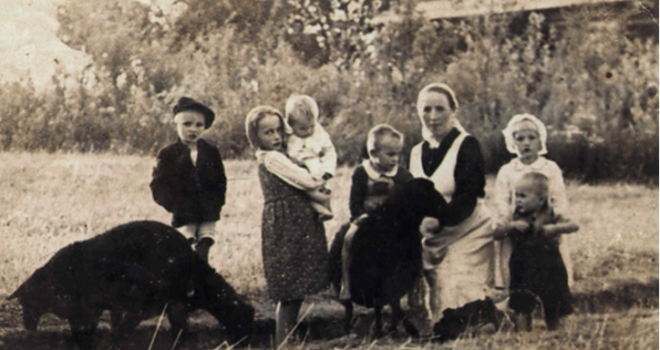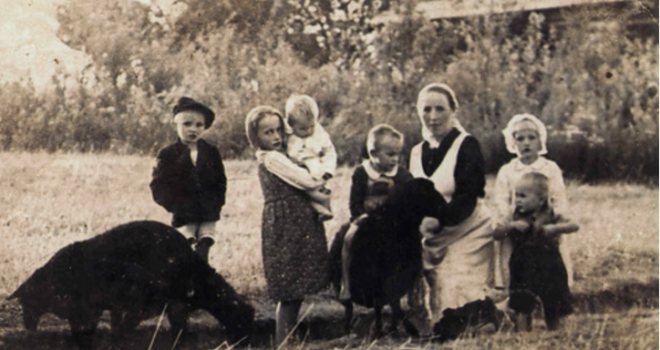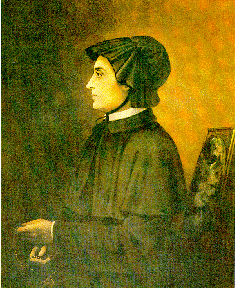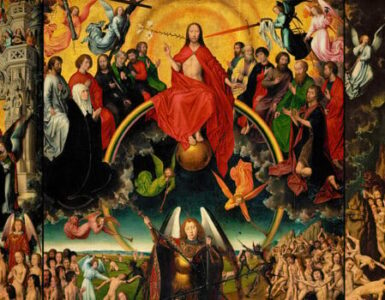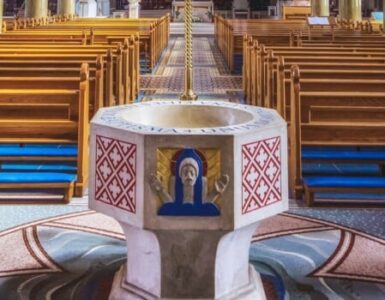A shadow had fallen on Markowa, a small village in south-eastern Poland, where a farmer, his wife, and children were living a faithful, humble life in 1944. Józef and Wiktoria Ulma had married nine years prior at St. Dorothy’s, their parish church in Markowa, while the world was edging toward a brutal war and genocide. In the years to follow, they welcomed the gifts of six children – Stasia, Basia, Władzio, Franio, Antoś, and Marysia – with a seventh on the way during the tumultuous year of 1944, a year that would demand immense bravery and complete sacrifice of the entire family.

Józef was an innovative farmer on the land they cultivated, being the first in his village to establish a fruit tree nursery. He specialized in propagating fruits and vegetables, breeding silkworms, and beekeeping, receiving awards from the County Agricultural Exhibition for his ingenuity.
He was also a photographer, capturing agrarian life and portraits of his wife and young children. The photographs reflect the family’s warm bond and deep love: children with their arms wrapped around each other, Wiktoria cuddled on Józef ’s lap, barefooted children on a well-worn country path, the family gathered on a picnic blanket, and smiling babies.


The Nazis invaded Poland in September 1939, catapulting the world into six years of war and immense suffering. In the summer of 1942, tragedy hit Markowa. The Ulmas’ Jewish neighbors were massacred by the Nazis. A small number managed to escape and flee into the surrounding areas of the village in fields and forests, with the constant threat of their pursuers on their heels. Hideouts were made in forests, ravines, and thickets. Józef Ulma built one such hiding place in a ravine near his home for a Jewish family.
To decrease the likelihood of Poles helping their Jewish neighbors, decrees were issued by the Governor-General of occupied Poland, Hans Frank. Anyone found harboring a Jew was to be killed. Soon, another decree stated that those who provided any support whatsoever to a Jew were subject to the same penalty.
The death penalty for helping Jews stated: “The same penalty [ed. – death] applies to those who knowingly provide such Jews with shelter or help them in any other manner (e.g. providing overnight accommodation, support or transporting them in any type of vehicle, etc.).”

The Ulmas were locally known as devout, cheerful, and loving Catholics. One day in the autumn of 1942, there was a knock at the Ulmas’ farmhouse door. It was a local Jewish man by the name of Saul Goldman (known by the surname “Szall” in Łańcut) along with his four sons who had heard of the Ulmas’ kindness toward their Jewish neighbors. They had fled their previous hiding place where Włodzimierz Leś, a Polish policeman, had been assisting them. As payment, they gave Leś their property. However, Leś soon ceased helping the Goldmans and refused to return their property to them.
The Golmans asked Józef and Wiktoria to hide them, and the couple agreed. A hiding place was prepared for the five men in the attic of their home. Soon, there was another knock on their door. It was two sisters, Gołda Grünfeld and Lea Didner, along with Lea’s young daughter, Reszla. They were the daughters and granddaughter of their Jewish neighbor, Chaim Goldman.
Eight souls were now in the Ulmas’ care, while the threat of death loomed over them all. Mateusz Szpytma, Ph.D., writes that, in the Ulma family’s Bible, two passages from the gospel of Luke were later found to be marked in red:
“You shall love the Lord your God with all your heart and with all your soul and with all your strength and with all your mind, and your neighbor as yourself.” – Luke 10:27
“But a Samaritan, as he journeyed, came to where he was, and when he saw him, he had compassion. He went and bound up his wounds, pouring on oil and wine. Then he set him on his own animal and brought him to an inn and took care of him.” – Luke 10:33-34
Józef and Wiktoria were committed to embodying these sacred words, despite the consequences of living them out under Nazi persecution.
The two Jewish families found refuge in the Ulma’s attic for over a year. They helped Józef with farm chores, such as chopping wood and tanning hides. Józef continued to document daily life through his camera, forever memorializing three of the Goldman brothers who are seen chopping wood on the Ulma’s homestead in one such photograph preserved by the Polin Museum. On the Ulmas’ isolated farm far from the village, they could almost forget they were in the eye of a lethal storm.
The evening of March 23, 1944, was the last time Józef and Wiktoria would kiss their children goodnight. Before dawn broke over the horizon on March 24, the storm descended. German police from Łańcut, along with the Polish Blue Police, arrived at the Ulmas’ farm under the command of Nazi officer Lieutenant Eilert Dieken. The police had been informed of a family who were hiding Jews in Markowa and quickly descended upon their attic. It is believed that Włodzimierz Leś gave the family away to the authorities.
Within moments, Saul, his sons, Golda, Lea, and Reszla were murdered. The Polish cart drivers waiting outside were ordered to watch what happened next: the punishment given to Poles harboring Jews. Edward Nawojski, one of the cart drivers, later testified to what he witnessed that day. Józef and Wiktoria, who was carrying their unborn child, were brought outside and shot in front of their house.
As the children cried for their parents, the perpetrators conferred on what to do with them. Lieutenant Eilert Dieken made the cruel decision to shoot them. Nawojski witnessed the death of the Ulma children – Stasia, Basia, Władzio, Franio, Antoś, and Marysia, ages 8 to 1.5. Three or four children were shot by the Czech-German Nazi, Joseph Kokott, whose brutality and ruthless words left an indelible mark in Nawojski’s memory. As quoted in Mateusz Szpytma’s article on the Ulma family, Kokott said: “Look, how Polish swine die – who hide Jews.” In just a few short moments, seventeen people were killed.
The German and Polish police began plundering the Ulmas’ home. Villagers were forced to dig a crude grave. Józef’s brother, Władysław Ulma, and others came under the cover of darkness a week later to properly bury them all in coffins. Following the liberation, the Ulma family was laid to rest in a local cemetery, while their Jewish friends were buried by a Jewish organization.
Józef, Wiktoria, and their seven children are heroic examples of loving to the point of death and giving everything they have to help their neighbor, virtues that were formed by their Catholic faith. They took to heart God’s command to “love your neighbor as yourself.” Józef and Wiktoria are known today as the “Samaritans from Markowa” and were recognized as Righteous Among Nations by Yad Vashem: The World Holocaust Remembrance Center in 1995.
In 2016, a museum opened in their name – The Ulma Family Museum of Poles Saving Jews in World War II. As Rod Gragg shares in his book My Brother’s Keeper, today a statue in Markowa recognizes the Ulmas’ sacrifice and reads: “Saving the lives of others, they laid down their own lives … May their sacrifice be a call for respect and love to every human being.”
In 2003, the beatification process for the Ulma family began in the Diocese of Przemyśl, and the family was named “Servants of God.” On December 17, 2022, Pope Francis officially recognized the Ulma family’s martyrdom and deep love of God and neighbor, approving their cause for beatification.
✠


